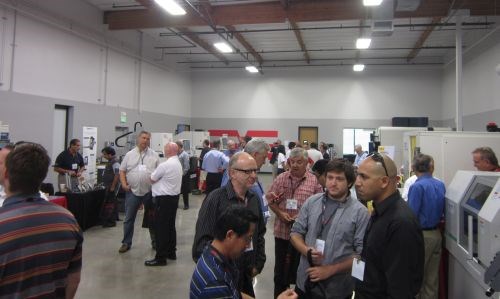Committing to Local Service and Support
The opening of Methods Machine Tools’ latest technology center is just the latest effort to double-down on the after-sales service that the company views as a key competitive edge.

Attendees gather at the opening of Methods’ new Southern California technology center. In addition to machine demos, the open house event featured seminars from technology suppliers including Delcam, Sandvik Coromant and Mitsubishi.
Even the highest-quality machine tool can be a tough sell without the ability to offer timely service, support and spare parts, often for years to come.
At least, that’s the impression I got from talking to key personnel at the grand opening ceremony for Methods Machine Tools’ Southern California technology center on June 25. James Hanson, director of corporate development, says opening that facility is just the latest effort in a national push to double down on the sort of local after-sales attention that Methods views as a key competitive edge. Just a month prior, the company opened another technology center to support customers in Northern California, Oregon and Washington. Before that, it made significant infrastructure improvements to its headquarters facility in Sudbury, Massachusetts. And, of course, Hanson wouldn’t rule out further moves in other localities if demand calls for it.
Bright, clean and featuring ample space and infrastructure for classrooms and machine demos alike, the 11,400-square-foot location in Anaheim is cut from the same mold as the company’s other regional sales and service centers. In contrast with the previous Southern California technology center, which it replaced, the new facility offers a greater breadth of product lines—Feeler, Fanuc, Yasda, Kiwa and Citizen. Offering customers the option of multiple builders for any given machine type while ensuring the same level of service and support is also an important market differentiator for Methods, Hanson notes.
Moreover, any selected machine is likely to have received extra attention on the front end, before the customer ever saw it. Hanson explains that Methods works with partners to tailor offerings specifically for the needs of U.S. customers. Consider Feeler, a line of machining centers, turning centers, bridge mills and boring mills manufactured by Fair Friend Group (FFG), one of the largest machine tool builders in the world. Some models sold in the U.S. by Methods are available shortened spindle collars—that is, the spindle protrudes less from the housing. This adds rigidity. Of course, models with longer collars are available for applications requiring more reach.

In addition to shorter spindle collars, many Feeler machines feature Z-axis box ways to ensure rigidity, while linear ways in X and Y ensure speed and accuracy.
Methods’ newest partner is gearing up to release its first machine with engineering support from the supplier—and, this particular machine tool builder is heavily focused on the mold and die industry. Given the fact that it’s now taking advantage of Method’s service and support network, Yasda is worth a closer look.















